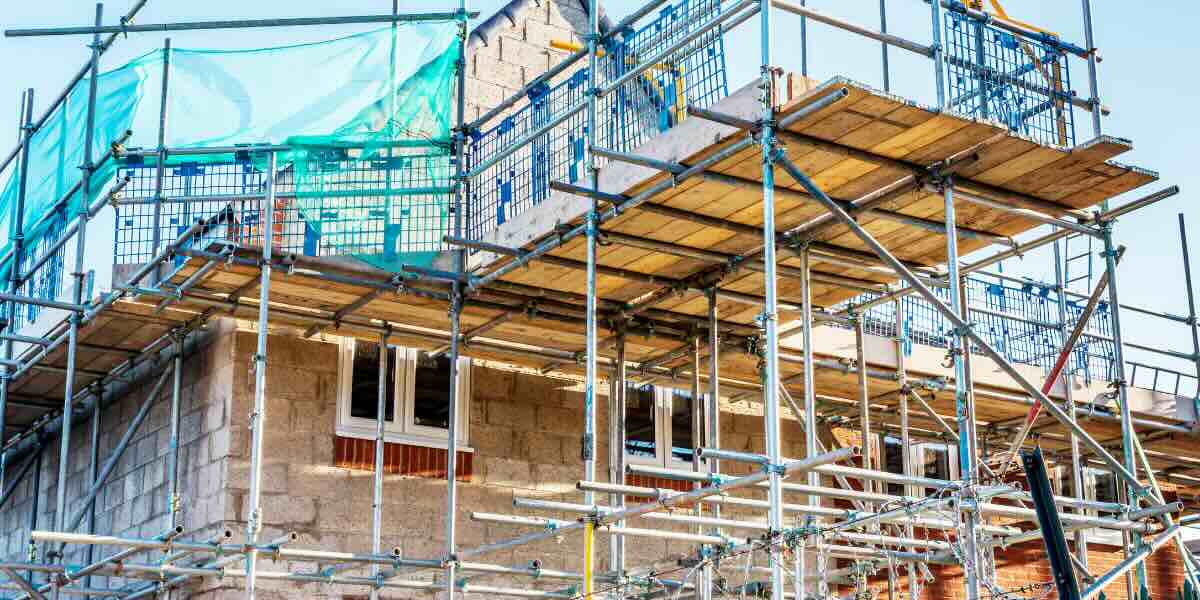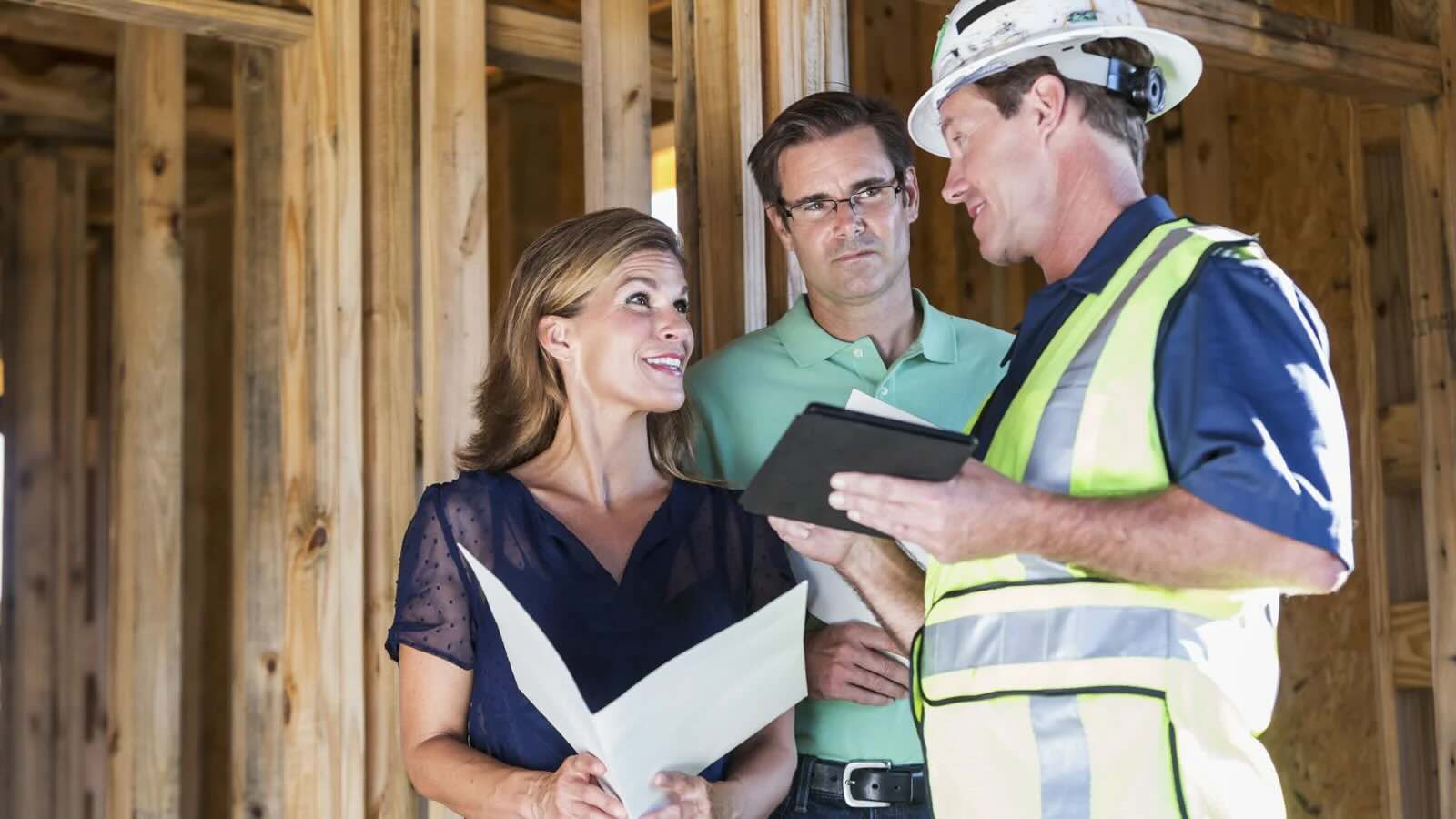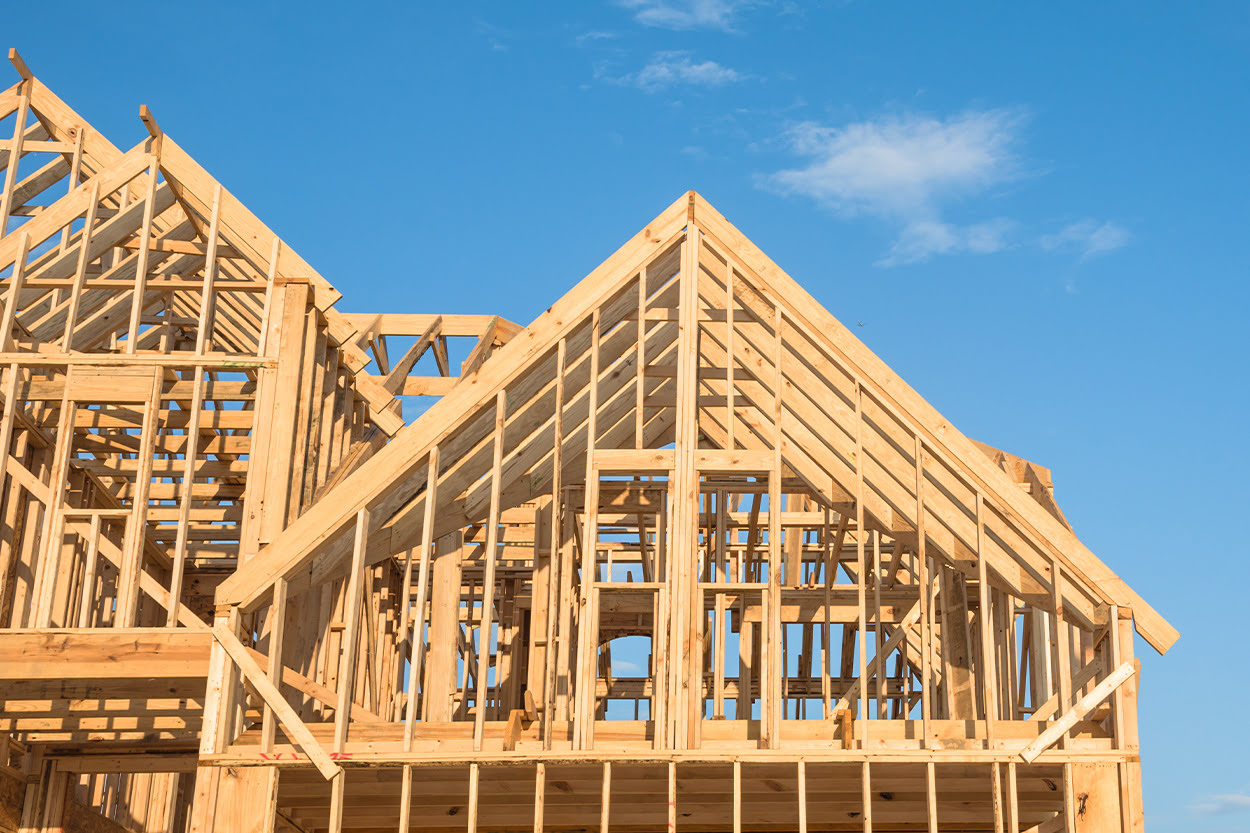Home>diy>Building & Construction>When To Schedule Home Inspection For New Construction


Building & Construction
When To Schedule Home Inspection For New Construction
Modified: December 7, 2023
Ensure the safety of your new construction project by scheduling a comprehensive home inspection at the right time. Learn when to book a building construction inspection for peace of mind.
(Many of the links in this article redirect to a specific reviewed product. Your purchase of these products through affiliate links helps to generate commission for Storables.com, at no extra cost. Learn more)
Introduction
Welcome to the world of home construction, where dreams become reality and sturdy structures take shape. Building a new home is an exciting endeavor, filled with anticipation and joy. However, it is essential to remember that the construction process is complex and multifaceted, involving numerous stages and intricate details.
One crucial aspect of building construction that should never be overlooked is the home inspection. Whether you are constructing your dream home or investing in a newly built property, scheduling a home inspection is a critical step in ensuring that the construction meets safety standards, adheres to building codes, and is of high quality.
While many people assume that a home inspection is only necessary for older properties or when selling or buying a home, the truth is that new construction also requires a thorough inspection. The misconception that a newly built home is free from any defects or issues can lead to potential problems down the line.
In this article, we will explore the importance of scheduling a home inspection for new construction and discuss the factors to consider when planning this essential step. We will also outline the benefits of scheduling inspections at different stages of the construction process, common issues found during new construction inspections, and how to choose a qualified home inspector for your project.
So, whether you are a homeowner overseeing the construction of your dream home or a real estate investor seeking new opportunities, fasten your hard hat and join us as we explore the world of home inspections for new construction.
Key Takeaways:
- Scheduling a home inspection for new construction is crucial to catch potential issues early, ensure compliance with building codes, and provide peace of mind for homeowners and investors.
- Choosing a qualified home inspector with expertise in new construction, professionalism, and a thorough approach is essential to ensure a comprehensive evaluation and the long-term safety and satisfaction of homeowners.
Importance of Home Inspection for New Construction
One of the common misconceptions among homeowners is that a home inspection is unnecessary for new construction. After all, shouldn’t a newly built home be free from any defects or issues? However, this assumption can lead to costly mistakes and potential problems in the future. Let’s explore why a home inspection is crucial for new construction projects.
First and foremost, a home inspection provides an independent evaluation of the construction quality and identifies any issues or defects that may exist. It is important to remember that even the most reputable builders can overlook certain aspects during the construction process. A home inspection acts as a safety net, ensuring that all aspects of the construction meet the required standards and codes.
A thorough inspection can help uncover hidden issues that may not be immediately visible. These can range from structural defects to problems with electrical or plumbing systems. Identifying these issues early on allows the builder to rectify them promptly, saving you from potential headaches and costly repairs down the line.
Another crucial aspect of a home inspection for new construction is ensuring compliance with building codes and regulations. Building codes are in place to protect homeowners and ensure that the construction is safe and structurally sound. A qualified home inspector can identify any areas where the construction falls short and work with the builder to bring it up to code.
In addition to providing peace of mind for homeowners, a home inspection also plays a vital role for real estate investors. If you plan to sell the property in the future, having a comprehensive inspection report can increase buyer confidence and help justify the asking price. On the other hand, if issues are identified during the inspection, you have the opportunity to negotiate repairs or adjustments with the builder before closing the deal.
Overall, a home inspection for new construction offers several key benefits. It ensures the quality and safety of the construction, helps uncover hidden issues, ensures compliance with building codes, and provides peace of mind for both homeowners and investors. Now that we understand the importance, let’s delve into the factors to consider when scheduling a home inspection for new construction.
Factors to Consider When Scheduling a Home Inspection for New Construction
When it comes to scheduling a home inspection for new construction, timing is crucial. Choosing the right time to conduct the inspection ensures that all crucial elements of the construction process are adequately evaluated. Here are some important factors to consider when scheduling a home inspection for your new construction project:
1. Construction Timeline:
The first factor to consider is the construction timeline. Ideally, you want to schedule the home inspection at a stage where the construction is near completion, but before the final finishes are applied. This will allow the inspector to examine the structural integrity, electrical and plumbing systems, insulation, and other critical components before they become hidden behind walls and finishes.
2. Pre-Drywall Inspection:
A pre-drywall inspection is highly recommended. This inspection takes place after the framing, electrical, plumbing, and HVAC systems are installed but before the drywall is hung. It allows the inspector to assess the quality of the construction, check for any potential defects, and ensure that everything is in compliance with building codes. It’s an excellent opportunity to address any issues before they are hidden behind the walls.
Read more: How To Schedule A Home Inspection
3. Final Walkthrough Inspection:
The final walkthrough inspection is typically conducted just before the builder hands over the keys to the homeowner. This inspection ensures that all systems are functioning correctly, and all finishes and fixtures are installed as specified. It provides an opportunity to address any remaining concerns and ensure that the construction meets the agreed-upon standards.
4. Builder’s Warranty:
Consider the duration of the builder’s warranty when scheduling a home inspection. It’s advisable to have the inspection conducted within the warranty period, as it allows you to discover and report any defects or issues covered by the warranty. This ensures that the builder is responsible for addressing and fixing any problems.
5. Accessibility:
Ensure that the construction site is accessible for the inspector. Clear communication with the builder is essential to coordinate the inspection and ensure that all necessary areas and systems are accessible for thorough evaluation.
6. Inspector’s Availability:
Lastly, consider the availability of qualified home inspectors. Research and find a reputable inspector who specializes in new construction inspections. Check their availability and schedule the inspection well in advance to secure their services.
By carefully considering these factors, you can schedule the home inspection at the right time during the construction process and ensure a comprehensive evaluation of your new home.
Read more: Who Schedules Home Inspection For Buyers
Recommended Timeline for Scheduling a Home Inspection
When it comes to scheduling a home inspection for new construction, timing is crucial. It’s essential to choose the right time within the construction process to ensure a thorough evaluation of the property. Here is a recommended timeline for scheduling a home inspection:
1. Pre-Drywall Phase:
One of the most critical stages for a home inspection in new construction is the pre-drywall phase. This is when the structural components of the home, electrical and plumbing systems, insulation, and HVAC are all visible before being concealed by drywall. Scheduling a home inspection at this stage allows the inspector to evaluate the quality of the construction, identify potential issues, and ensure compliance with building codes.
2. Final Walkthrough:
The final walkthrough is another crucial time to schedule a home inspection. This inspection typically takes place just before the builder hands over the keys to the homeowner. It allows the inspector to assess the overall condition of the property, the functionality of systems and fixtures, and ensure that all finishes and details are completed as specified. It provides an opportunity to address any remaining concerns and ensure that the construction meets the agreed-upon standards.
3. Builder’s Warranty Period:
It’s advisable to schedule a home inspection within the builder’s warranty period. Most builders offer a warranty that covers certain aspects of the construction for a specific period, typically one to two years. Having a home inspection during this time allows you to discover and report any defects or issues covered by the warranty. This ensures that the builder is responsible for addressing and fixing any problems that arise.
Read more: How To Schedule Home Inspection In Cleveland
4. Customized Inspection Timeline:
Depending on the specific circumstances and requirements of your construction project, you may need to schedule additional inspections at specific stages. For example, if you have unique features or specialized systems in your home, such as a geothermal heating system or a home automation system, you may want to schedule inspections during the installation or commissioning of these components.
5. Coordination with the Builder:
Effective communication and coordination with the builder are essential when scheduling a home inspection. Discuss your intentions to have an inspection early on and coordinate with the builder to ensure that the necessary areas and systems are accessible to the inspector. This includes providing access to all parts of the property and coordinating with subcontractors to ensure they are present during the inspection if required.
By following this recommended timeline and considering the unique aspects of your construction project, you can schedule your home inspection at the most appropriate and effective times. This ensures that your new construction is thoroughly evaluated, meets all necessary standards, and provides you with peace of mind as you move into your new home.
Benefits of Scheduling a Home Inspection in the Pre-Drywall Phase
One of the key stages for scheduling a home inspection in new construction is during the pre-drywall phase. This is the stage when the structural elements of the home are visible, before they are covered by drywall. Let’s explore the benefits of scheduling a home inspection during this critical phase:
1. Identifying Potential Issues Early:
By scheduling a home inspection in the pre-drywall phase, you have the opportunity to identify potential issues or defects before they are hidden behind walls. This allows the inspector to assess the construction quality, electrical wiring, plumbing systems, insulation, and other critical components. Any issues or discrepancies can be addressed promptly, saving you from potential future problems.
Read more: When Is HVAC Installed In New Construction
2. Compliance with Building Codes:
The pre-drywall phase is an ideal time for the home inspector to verify that the construction is in compliance with local building codes. This includes ensuring that structural elements, electrical wiring, plumbing systems, and insulation meet the required standards. By addressing any code violations during this phase, you can avoid costly modifications or corrections later on.
3. Assessing Quality of Workmanship:
Scheduling a home inspection during the pre-drywall phase allows the inspector to evaluate the quality of workmanship. They can observe the installation of structural components, such as the framing and roof, ensuring that everything is properly aligned and sound. This assessment can help identify any issues or potential weaknesses that need to be addressed to maintain the integrity of the structure.
4. Ensuring Proper Installation of Systems:
During the pre-drywall phase, the home inspector can assess the installation of electrical, plumbing, and HVAC systems. They can check for proper connections, secure wiring, and accurate placement of fixtures. This ensures that these systems are installed correctly and functioning as intended, minimizing the risk of future malfunctions or safety hazards.
5. Open Communication with the Builder:
Scheduling a home inspection in the pre-drywall phase allows for open communication with the builder. Any issues or concerns identified can be discussed and resolved before the construction progresses further. This phase provides an opportunity for collaboration between the homeowner, builder, and inspector to address any discrepancies and ensure the construction meets the desired standards.
By taking advantage of a home inspection in the pre-drywall phase, you can catch potential issues early, ensure compliance with building codes and regulations, evaluate the quality of workmanship, verify proper installation of systems, and foster effective communication with the builder. This inspection phase plays a vital role in ensuring a well-built, safe, and high-quality home for years to come.
Benefits of Scheduling a Home Inspection Before the Final Walkthrough
While conducting a home inspection in the pre-drywall phase is crucial, scheduling an additional inspection before the final walkthrough offers its own set of unique benefits. Let’s explore the advantages of scheduling a home inspection before the final walkthrough:
1. Discovering Any Unfinished or Defective Work:
During the final walkthrough inspection, the home inspector can identify any unfinished or defective work that may have been overlooked during the construction process. This includes incomplete or improperly installed fixtures, missing trim or molding, or unfinished final touches. Addressing these issues before the final walkthrough allows the builder to rectify them promptly, ensuring that your home is completed to the agreed-upon standards.
2. Verifying Completion of Repair Requests:
If there were any repair or correction requests made during the initial home inspection or pre-drywall phase, scheduling an inspection before the final walkthrough allows you to ensure that these requests have been fully addressed. By verifying that the repairs have been completed to your satisfaction, you can feel confident in the condition of your home before taking ownership.
3. Testing Functionality of Systems and Fixtures:
The final walkthrough inspection provides an opportunity to test the functionality of various systems and fixtures in the home, such as electrical outlets, plumbing fixtures, HVAC systems, and appliances. The home inspector can ensure that everything is functioning as expected, minimizing the risk of encountering unexpected issues once you move in.
Read more: How To Make A Construction Schedule
4. Addressing Any Last-Minute Concerns:
Before the final walkthrough, you may have specific concerns or questions about the construction that you would like to discuss with the builder. Scheduling a home inspection at this stage allows for open communication and the opportunity to address any last-minute concerns or requests. Clearing these up in advance ensures a smooth and satisfactory final walkthrough experience.
5. Providing Peace of Mind:
The final walkthrough inspection provides peace of mind for homeowners. By having a qualified home inspector assess the property one last time before taking ownership, you can be confident that your new home is in excellent condition and meets the highest quality standards. It provides reassurance that any construction-related issues have been addressed and that you can confidently move forward with your purchase.
Scheduling a home inspection before the final walkthrough allows for the identification and resolution of unfinished or defective work, verification of repair requests, testing the functionality of systems and fixtures, addressing any last-minute concerns, and providing peace of mind for homeowners. Taking this additional step ensures that your new home is ready for you to create lasting memories.
The Role of the Home Inspector During the Inspection Process
When scheduling a home inspection for new construction, it’s important to understand the role of the home inspector and what to expect during the inspection process. A qualified home inspector plays a crucial role in evaluating the construction quality, identifying potential defects or issues, and ensuring compliance with building codes. Let’s explore the role of the home inspector in more detail:
1. Thorough Evaluation:
The primary responsibility of a home inspector is to conduct a comprehensive evaluation of the property. This includes examining the structural components, electrical systems, plumbing systems, HVAC systems, insulation, roofing, and other critical elements of the construction. The inspector will carefully inspect each area to identify any potential issues or defects that may affect the functionality, safety, or longevity of the home.
Read more: When Is HVAC Installed In New Construction
2. Compliance with Building Codes:
During the inspection process, the home inspector will ensure that the construction meets the applicable building codes and regulations. This involves evaluating the construction methods, installation techniques, and materials used to ensure compliance with local building standards. Any areas where the construction falls short of the required codes will be identified and documented in the inspection report.
3. Attention to Detail:
A skilled home inspector pays close attention to detail, thoroughly examining each component of the construction. They look for signs of structural damage, improper installation, faulty wiring, plumbing leaks, insulation deficiencies, and other potential issues. By meticulously scrutinizing the property, the home inspector can provide an accurate and detailed assessment of its condition.
4. Objective and Impartial Assessment:
One of the key roles of a home inspector is to provide an objective and impartial assessment of the property. They do not have any vested interest in the construction, ensuring that their evaluation is unbiased. This impartiality allows the home inspector to focus solely on providing an accurate assessment of the construction quality and identifying any potential defects or issues.
5. Clear and Detailed Reporting:
After conducting the inspection, the home inspector will provide a detailed report that outlines their findings and recommendations. This report will include a summary of the inspection results, descriptions of any issues or defects found, and recommendations for repairs or further evaluations. The report serves as an essential document for homeowners and builders to address any needed repairs or corrections.
6. Communication and Education:
Throughout the inspection process, the home inspector plays a role in educating homeowners about the property they are purchasing. They may explain the function of various systems and offer guidance on maintenance and safety practices. Additionally, they can answer any questions homeowners may have and provide clarity on the condition of the construction, helping them make informed decisions.
By understanding the role of the home inspector during the inspection process, homeowners can have confidence in the thoroughness and expertise of the inspector’s evaluation. Their objective assessment and detailed reporting contribute to ensuring a safe and high-quality home construction.
Common Issues Found During Home Inspections for New Construction
While the construction of a new home is typically a dependable process with skilled professionals involved, it’s still essential to conduct a home inspection to identify any potential issues or defects. Even with the best builders, there can still be areas that require attention. Here are some common issues that may be found during home inspections for new construction:
1. Electrical Problems:
Electrical issues are among the most common problems found during home inspections. This can include improperly installed wiring, inadequate grounding, faulty outlets or switches, and insufficient electrical panel capacity. These issues can pose safety risks and may require the services of a licensed electrician to remedy.
2. Plumbing Deficiencies:
Plumbing problems can range from minor leaks to more significant issues such as improper pipe installation, inadequate water pressure, or drainage problems. Home inspectors will check for any visible leaks, proper connection of pipes, functioning fixtures, and potential problems with water heaters or sump pumps.
Read more: What Does A Construction Scheduler Do
3. HVAC System Inefficiencies:
Home inspectors will assess the performance and efficiency of the heating, ventilation, and air conditioning (HVAC) system. This includes checking for proper installation, functioning thermostats, airflow, and insulation. Issues such as inadequate heating or cooling capacity, improper ductwork, or malfunctioning components may be identified during the inspection.
4. Structural Defects:
Structural issues are critical to identify during a home inspection. These can include problems with the foundation, such as cracks or settlement, improper framing or roof construction, or issues with load-bearing walls. Ensuring the structural integrity of the home is vital for safety and longevity.
5. Insulation and Energy Efficiency:
Home inspectors will evaluate the quality and effectiveness of insulation in the home. Inadequate insulation can result in energy loss, reduced comfort, and higher utility bills. Inspectors may also assess the sealing of windows and doors to ensure energy efficiency and proper insulation throughout the home.
6. Exterior and Roofing Issues:
The exterior of the home and the roof will be inspected for potential problems such as improper installation of siding, issues with drainage or grading, or roofing defects. This includes checking for leaks, missing shingles, damaged flashing, or improper ventilation in the attic space.
While these are some common issues found during home inspections for new construction, it’s important to note that every inspection is unique. The specific issues identified will depend on factors such as the builder’s workmanship, quality control processes, and the overall construction standards. The purpose of the inspection is to uncover any potential problems and ensure that they are addressed before the home is occupied. By conducting a thorough inspection, homeowners can have peace of mind knowing that their new construction meets the necessary standards of quality and safety.
How to Choose a Qualified Home Inspector for New Construction
Choosing a qualified home inspector for your new construction project is a crucial step in ensuring a thorough and accurate evaluation of the property. Here are some important factors to consider when selecting a home inspector:
1. Licensing and Certification:
Ensure that the home inspector you choose is licensed and certified in your state or region. Licensing and certification requirements vary, so it’s important to verify that the inspector meets the necessary qualifications. This ensures that they have the knowledge and expertise to conduct a comprehensive inspection.
2. Experience and Expertise:
Look for a home inspector with experience in new construction inspections specifically. It’s important that they understand the unique aspects of evaluating newly built homes, including knowledge of building codes, construction techniques, and common issues found in new construction. Ask about their background and expertise to ensure they are well-equipped to assess your property.
3. Professionalism and Reliability:
Choose a home inspector who demonstrates professionalism and reliability. They should communicate clearly, be prompt in scheduling appointments, and provide thorough and timely inspection reports. A professional home inspector will also answer any questions you may have and offer explanations of their findings in a clear and understandable manner.
4. Reputation and Reviews:
Research the reputation of the home inspector by reading reviews and testimonials from past clients. Look for positive feedback and satisfied customers who were happy with the quality of the inspection and the inspector’s level of service. Also, consider asking for recommendations from friends, family, or your builder to find a reputable home inspector.
5. Inspection Services Provided:
Ensure that the home inspector offers the specific inspection services you require for new construction. This may include inspections at different stages of the construction process, such as pre-drywall, final walkthrough, or specialized inspections for unique features or systems in your home. Knowing what services are provided will help ensure that all aspects of your construction are thoroughly evaluated.
6. Cost and Value:
While cost should not be the sole determining factor, it’s important to consider the value provided by the home inspector. Compare prices among different inspectors, keeping in mind the inspector’s qualifications, experience, and services offered. Look for a balance between competitive pricing and the level of expertise and thoroughness you expect from a qualified professional.
By considering these factors and conducting thorough research, you can choose a qualified home inspector who will provide a comprehensive evaluation and ensure that your new construction meets the necessary standards of quality and safety.
Conclusion
When it comes to new construction, scheduling a home inspection is a crucial step in ensuring the quality, safety, and integrity of your investment. While the construction process may seem flawless, there can still be hidden issues or defects that need to be addressed. A qualified home inspector plays an essential role in thoroughly evaluating the property, identifying potential problems, and ensuring compliance with building codes and standards.
By scheduling a home inspection during the pre-drywall phase, you can catch potential issues before they are concealed behind finishes, ensuring that the construction meets the required standards at its core. Additionally, scheduling an inspection before the final walkthrough offers the opportunity to verify completion of repairs, test the functionality of systems and fixtures, and address any last-minute concerns.
During the inspection process, a qualified home inspector will play a crucial role in evaluating the construction quality, identifying potential issues, and providing an objective assessment. They will thoroughly examine the structural components, electrical systems, plumbing systems, HVAC systems, insulation, and other critical elements of the construction. The inspector’s knowledge, experience, and attention to detail will contribute to a comprehensive evaluation and provide valuable insights for homeowners and builders alike.
Common issues found during home inspections for new construction may include electrical problems, plumbing deficiencies, HVAC inefficiencies, structural defects, insulation and energy efficiency concerns, and exterior and roofing issues. By identifying and addressing these issues early on, homeowners can avoid future headaches and ensure a safe and comfortable living environment.
When choosing a qualified home inspector for your new construction project, consider factors such as licensing and certification, experience and expertise, professionalism and reliability, reputation and reviews, inspection services provided, and cost and value. By selecting a reputable and knowledgeable inspector, you can be confident in the thoroughness and accuracy of the inspection process.
In conclusion, scheduling a home inspection for new construction is an essential step to protect your investment and ensure peace of mind. From evaluating the quality of the construction to identifying any potential issues, a qualified home inspector provides invaluable insights and promotes the long-term safety and satisfaction of homeowners. By understanding the importance of home inspections, considering the recommended timeline, and selecting a qualified inspector, you can navigate the construction process with confidence and enjoy your new home for years to come.
Frequently Asked Questions about When To Schedule Home Inspection For New Construction
Was this page helpful?
At Storables.com, we guarantee accurate and reliable information. Our content, validated by Expert Board Contributors, is crafted following stringent Editorial Policies. We're committed to providing you with well-researched, expert-backed insights for all your informational needs.





0 thoughts on “When To Schedule Home Inspection For New Construction”